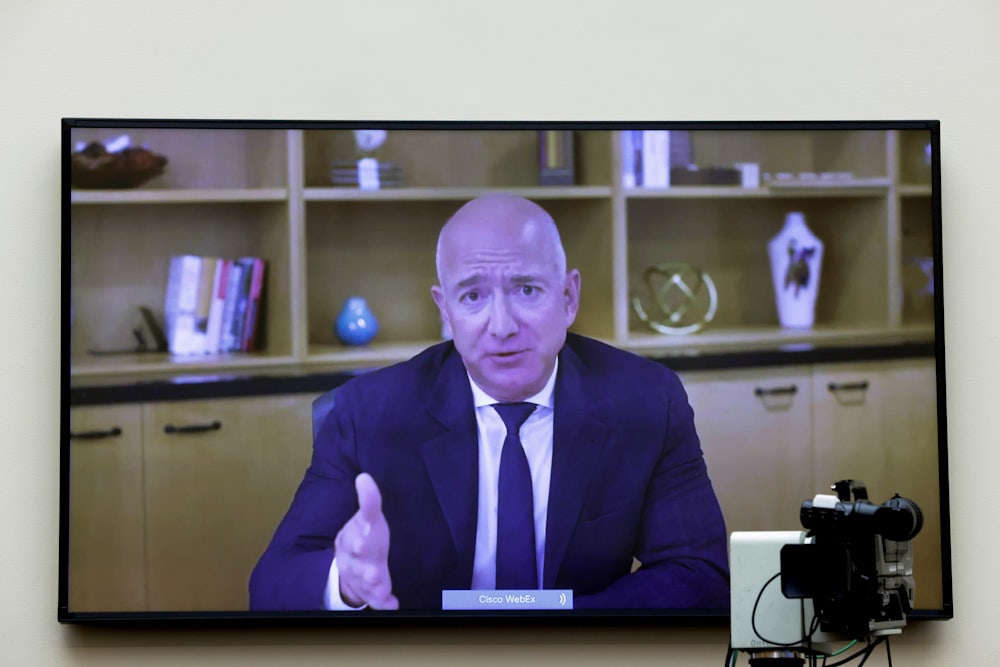Last week, while as many as 25 million laid-off workers lost their weekly $600 federal unemployment supplement and Congress bickered over government aid for people cut off from their income, Amazon Chief Executive Officer Jeff Bezos sold over $3 billion in his company’s stock. That sell-off came after several consecutive weeks of Bezos’s and other billionaires’ net worths surging as the stock market rebounded. Since April, billionaires have not only been insulated from the worst of the pandemic and the foundering economy but together have seen their fortunes increase by an estimated $637 billion.
Amid the coronavirus pandemic and economic collapse, the already grotesque divide between the top 0.01 percent and everyone else has widened further. The record-breaking bounty enjoyed by the few has been matched only by the spike in precarity for the many. Over the same period that billionaires reaped record earnings, food insecurity across the nation doubled. Twenty-eight million renters are on the verge of eviction, unemployment is above 10 percent (with an estimated 40 percent of the jobs lost during the pandemic potentially gone forever), and the cash-strapped Postal Service is struggling to keep afloat months before an election that will depend more heavily than usual on mail-in voting. Despite President Trump’s blustering promises, there are few signs that any of this stands to improve by the end of the year, which guarantees a long stretch of hardship for the majority of workers. “You’ve got a kind of overwhelming sense of dread,” one laid-off bartender in Oregon told the Associated Press about his bleak financial prospects. “But there’s not a whole lot I can really do about it.”
While Congress haggles over the details of a new stimulus bill, the most straightforward solution to the vast gulf between the billionaires and the rest of us—particularly now, as several states verge on bankruptcy and Americans grapple with financial ruin—is to soak the rich.
Last Thursday, Senator Bernie Sanders introduced a bill to tax the pandemic-time profits of billionaires at 60 percent to cover health care costs for all Americans over the next year. This would help the millions of people who have lost employer-sponsored health insurance (or lacked any, to begin with), while a life-threatening virus continues to spread. But the proposal will have a hard slog ahead in a Republican-controlled Senate, not to mention with Trump, who recently signaled some mild disapproval of rampant income inequality but has also been more than willing to help line the pockets of his wealthy cronies.
More depressing still, Democrats at both the national and state levels have failed to present a united front on taxing the rich, though it’s something that 91 percent of Democratic voters and even 65 percent of Republicans agree should be done to mitigate inequality. New York Governor Andrew Cuomo has vowed not to raise taxes on billionaires, allegedly to preserve their residency in the state (and presumably, to keep his campaign coffers flush), but several studies suggest that the tax flight is largely nonexistent. “You got to come back, when are you coming back?’” Cuomo jokingly pleaded to elites who had left the city to shelter in the Hamptons. “We’ll go to dinner, I’ll buy you a drink, come over, I’ll cook.” Likewise, Democratic Senator Chuck Schumer and Representative Tom Suozzi are pushing to repeal a cap on state and local tax (SALT) deductions, a change that would overwhelmingly benefit high earners rather than working-class people.
“Without the full SALT deduction families will leave New York, and the last thing we need in the midst of the health and economic devastation of coronavirus is to lose our residents and taxpayers,” Suozzi said in a statement last month. Like Cuomo, he meant wealthy families: Though the deduction cap was originally a cynical ploy engineered by the Trump administration to offset corporate tax cuts (and simultaneously hit blue states), the Center on Budget and Policy Priorities has argued that repealing the cap would do almost nothing for the bottom 80 percent of households while also costing hundreds of billions in tax revenue.
At a time when millions of Americans face profound immiseration, and with Congress unwilling to deliver relief, the ruling class hardly needs any more glad-handing. Treating oligarchs delicately in the hopes that they’ll relinquish their riches on their own hasn’t worked out particularly well so far. Ten years ago this week, a group of billionaires—including Bezos, Warren Buffett, Bill Gates, and Elon Musk—signed the Giving Pledge, a commitment to donate at least half of their wealth to charity. But according to a recent report from the Institute for Policy Studies, that scheme hasn’t yielded much. Billionaires’ wealth has increased so dramatically over the last decade that the amount they’ve given away pales in comparison to what they’ve accumulated. Moreover, a significant portion of their charitable donations inevitably ends up in private foundations, free from both taxes and public oversight. As Chuck Collins of the Institute for Policy Studies wrote, “Instead of supporting charities on the frontlines of problem solving, these billions end up sitting in tax-advantaged intermediaries.” Philanthropy remains a pretty poor mechanism for redistributing wealth.
What, then, could be the downside to finally confronting the billionaire class head-on? Earlier this week, as food banks across the nation reported continued unprecedented surges in demand, Apple’s Tim Cook officially achieved billionaire status. One possible consequence of raising taxes on such earners, Cuomo recently lamented, would be that “you’d have no billionaires left.” He only meant that they’d abscond from New York, but given the extreme disparity that defines the present moment, “no billionaires” should be the point.
